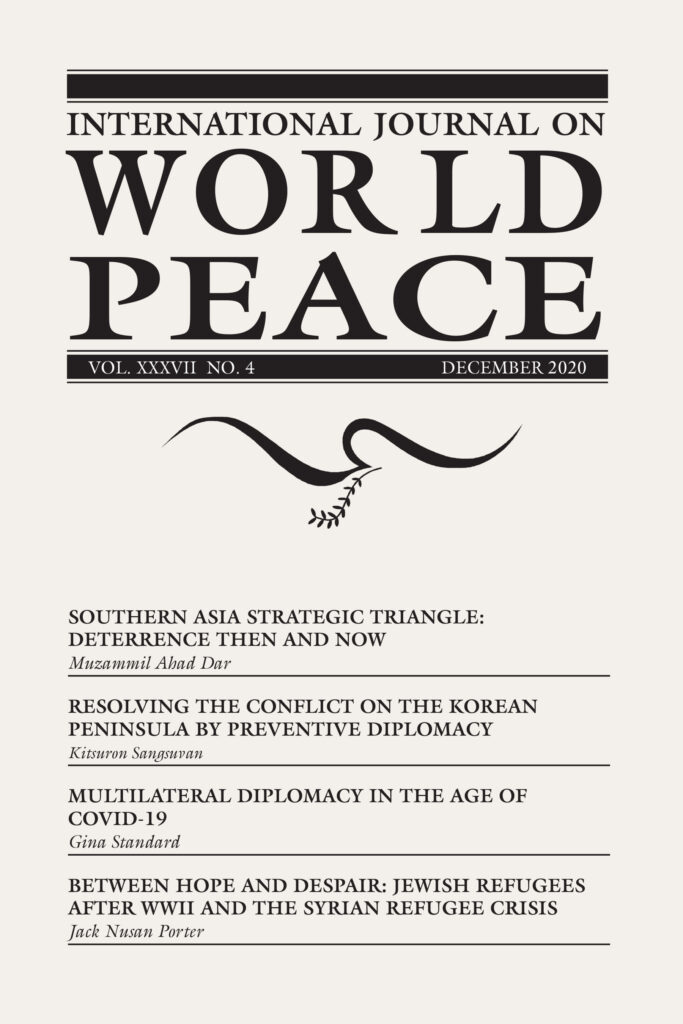Deterrence, Diplomacy, and Refugees: Then and Now
Introduction to IJWP, December 2020
The world has changed a lot since World War II. Science gave us the nuclear bomb, the internet, and the means to more than triple the world’s population—from 2.3 billion to 7.9 billion. The articles in this issue address how these developments have changed deterrence, diplomacy, and refugees.
Our first article, “Southern Asia Strategic Triangle: Deterrence Then and Now,” by Muzammil Ahad Dar both describes the evolving nature of deterrence and its nuances and reminds us that there are regional strategic relations within the larger global system. In South Asia there is a strategic triangle between the nuclear states of China, India, and Pakistan, with China providing an umbrella for Pakistan as a deterrent against Indian aggression. With the changing configuration of power internationally, and the threat of terrorists getting hold of nuclear weapons, former deterrence strategies are less effective. Dar also raises the concept of the need to defend civilizations, not just states.
Our second article, “Resolving the Conflict on the Korean Peninsula by Preventive Diplomacy,” by Kitsuron Sangsuvan, focuses on “preventive diplomacy” a term introduced by UN Secretary General U Thant (1960) and further developed by his successors. UN Secretary General Antonio Guterres has focused on preventive diplomacy, highlighting conflict prevention as the basis for a modern peace architecture for the UN. Sangsuvan analyzes the conflict on the Korean peninsula and applies the principles of preventive diplomacy to the task of resolving it.
“Preventive diplomacy” stands in stark contrast to the idea of “preventive war,” which was used to justify the U.S. invasion if Iraq in 2003. Preventive war lies outside the moral boundaries of traditional just war theory since the Peace of Westphalia. Just war theory states that any aggression by one state against another is not just, but that aggression can justly be repelled by proportional force against the aggressor. Preventive war is one type of aggression the UN Security Council was established to deter and intervene if necessary. Preventive diplomacy is the fostering of harmonious relations and development removing the proclivity for violence.
Our next article, by Gina Standard, looks at the changing nature of diplomatic conferences with the development of “virtual conferencing” over the internet, which has been accelerated by the COVID-19 pandemic.There are numerous “pros” to virtual diplomacy. Money can be saved, they can be arranged on shorter notice, they can include people farther distances apart, and you might be able to get some participants you could never get to sacrifice time for travel to a physical meeting. But there are also “cons.” Virtual conferencing will remain a major part of diplomacy when the world opens back up after the threat of COVID-19 is reduced.
Our final article, by Jack Porter, compares the care for, and fate of, Jewish refugees after the Holocaust and the refugees from the recent Syrian wars. Most developed countries have been willing to accept a few refugees at a time, but floods of refugees tend to cause a cultural or nationalist backlash. One major difference is that new homelands will no longer be created, like Israel was created in 1948 to welcome Jewish refugees. The outlook for new waves of refugees seems bleak unless ways are found to create stable and developed states that allow pluralism and do not allow the violence and discrimination against their own citizens that causes refugees in the first place. Like “preventive diplomacy,” some kind of “preventive refugee” knowledge about governance should be created and applied.
Finally, I would like to highlight the review of The Past Can’t Heal Us: The Dangers of Mandating Memory in the Name of Human Rights by Lea David. This book challenges many assumptions of social activists and NGOs, arguing that memorialization efforts are often based upon false premises that can end up reinforcing divisions within the populations targeted and, moreover, become an oppressive force in their own right. Human thus rights is an ideology with its own vision of how the world should function. Memorialization efforts “often fail to address complexities and often reinforce ethnic differences as various groups vie for the coveted cover of victimhood and thus reify the divisions that moral remembrance was supposed to transcend.”


Comments
Deterrence, Diplomacy, and Refugees: Then and Now — No Comments
HTML tags allowed in your comment: <a href="" title=""> <abbr title=""> <acronym title=""> <b> <blockquote cite=""> <cite> <code> <del datetime=""> <em> <i> <q cite=""> <s> <strike> <strong>